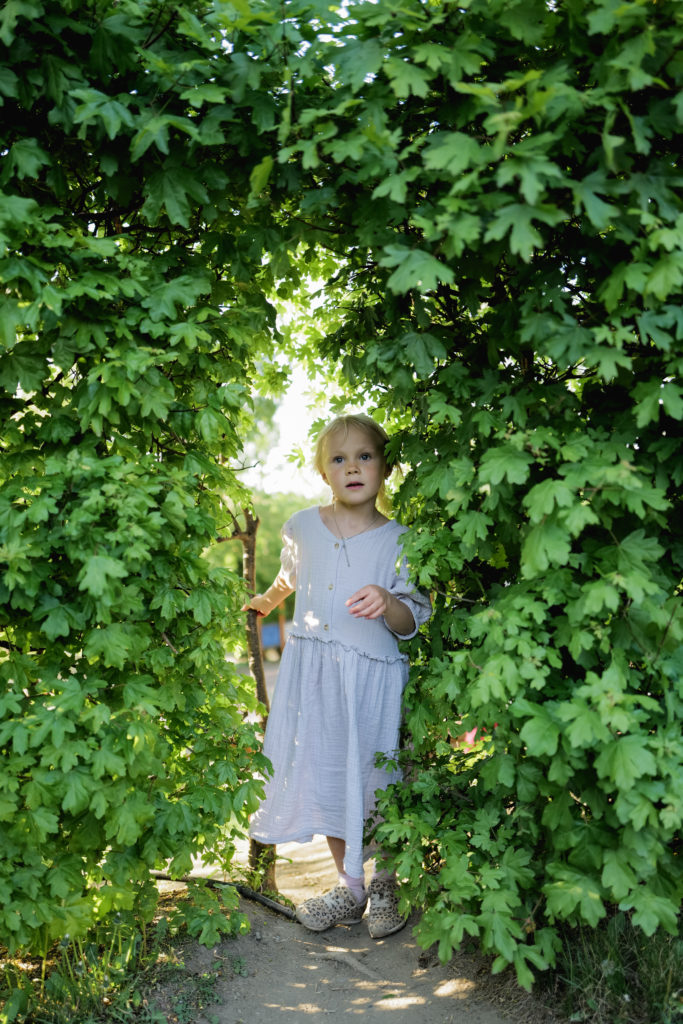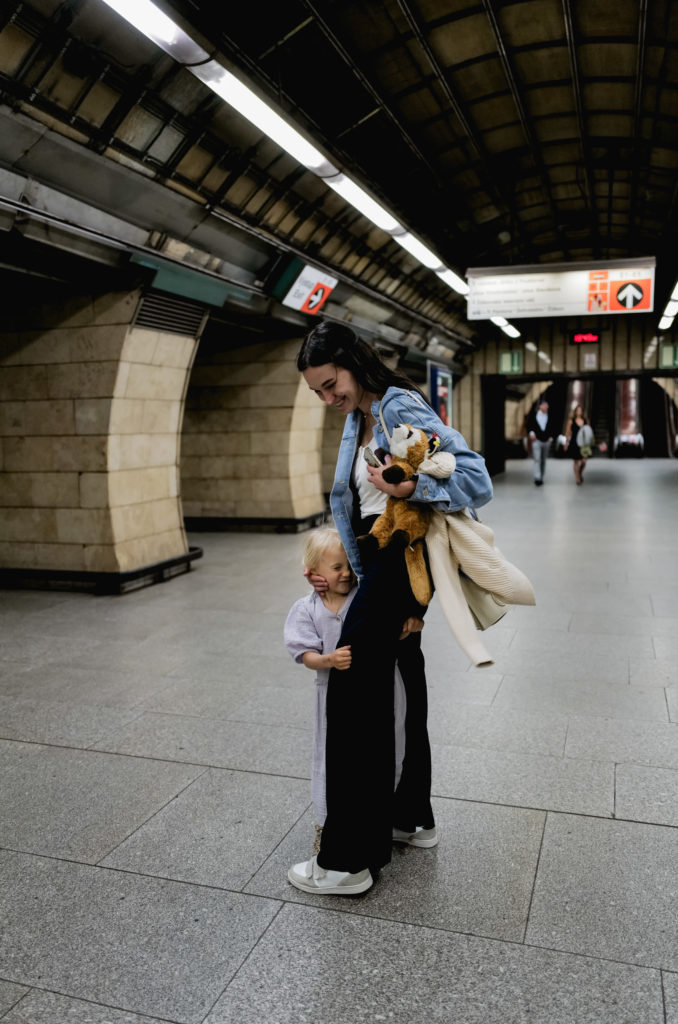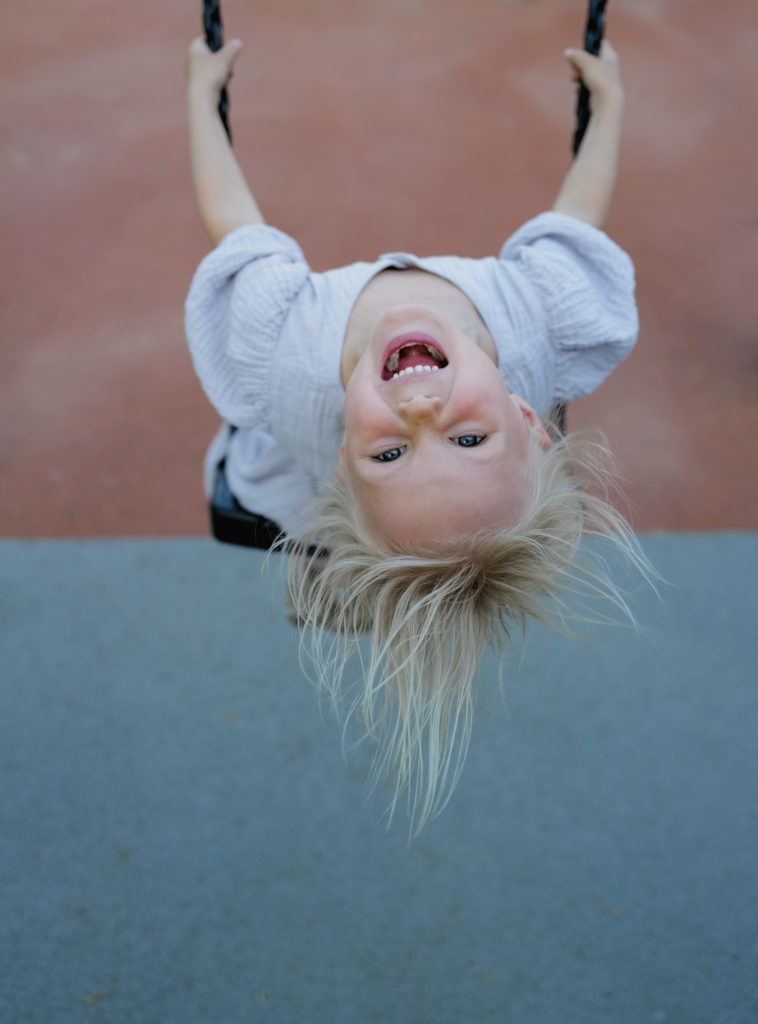Alina Golovlyova is a stop motion artist who escaped Kyiv together with her little daughter on the 2nd of March. Alina’s husband, Zhenya, had to stay in Kyiv, because during the war it is forbidden for men between 18 and 60 to leave the country.
I have known Alina since 2017, when I attended one of her stop motion animation courses. Ever since then, we’ve been in touch on Instagram.
While eating a sweet bun, Sasha starts to make funny faces. Since I’m a photographer and never miss the chance to catch the moment, I make several pictures of the cute girl. Alina and I start laughing at Sasha’s behaviour – but after a few seconds, we’re back to the serious topics and we start talking about how the two of them ran away from home.

I think the photos are going to be great! How are you doing?
Better. We’ve left the hotel and moved in with Czech friends, planning to rent a flat. We have to wait for another month until it’s available. But even the feeling of not being in a hotel is already so heartwarming. It felt like we were frozen in time, nothing was happening. And today, I finally had my first working day since we relocated!
Where do you work?
I shoot animations in a Czech film studio or at home. I have also been working on a stop motion online course and all the things that I didn’t have time to do before. Finishing my lessons, designing creative formats for ads, and so on.
Alina gets distracted by her daughter and I start filming her.
Your daughter is so photogenic! I miss photo shooting children so much, you can’t even imagine. And you know, it’s so strange, ever since we moved to Prague, I’ve even started to feel like I want a baby. This place somehow makes you feel safe and secure. When I was in Odessa, I was worried that something would go wrong all the time.
Agree. And I would also like to adopt the experience of the family we are staying with now. They have everything perfectly balanced in all spheres of life.

The animal sense of danger
What was on your mind on the first day of the war?
I don’t even know. There’s no word I can use to describe it concisely and accurately. I was lost. I knew we had to pack up. And I managed to focus enough to google what should be in our emergency bag. Before the war, when the situation was escalating, we packed all the necessary documents, withdrew some money, but no one was packing any stuff. Because we still didn’t believe the war would start.
When did you realize that the situation was getting serious?
When we heard a fighter plane really close to our windows. It was sort of an animal sense of danger because you can’t control it. And, for the first time, it became really frightening. Also, on the day we decided to escape, we were looking out the windows at the Moscow Avenue, and the cars were not moving at all. And someone was constantly calling me on the phone, and I could not say a word, not being able to string the words together. I didn’t understand anything, started to shake, but then I also felt relieved for a little. All in all, it was very rambling.
What did you pack for the journey?
I remember packing some things and then realizing that these weren’t the right ones. My husband Zhenya somehow got ready quickly, he prepared camping backpacks, rolled up camping rugs, and assembled some burners. And I stacked the most valuable things: my hard drives, laptops, cameras. Then I piled everything up, there was this huge mountain of equipment, and I asked myself: “Where are you going to run with that, Alina? “(laughs).
Sasha starts laughing and says: Funny mummy. Mummy is a technology lover!
And what about Sasha? How has she been coping?
One night, when we were still in Ukraine deciding whether to leave or not, Sasha woke up in the middle of the night, opened her eyes and the first thing she said was: “Mommy, Mommy, I’m going to get ready very quickly. I just don’t know where my shoes are!” And that’s when I realized that… (Alina’s eyes fill with tears) it’s not something a five-year old child should be thinking about. That was the moment we decided to leave.
Did Zhenya push you into that decision?
During the first days of the war, he had hoped that it would all be solved quickly, and that there was no need to rush. Then he realized that I couldn’t stand it emotionally because of the constant anxiety, and he convinced me it would be a good idea to leave. I had a really strong emotional reaction to the first days of the war. Especially when Russian subversive groups came to the evacuation shelters, asking if all the people were civilians, if there was no military. I had no idea what they were capable of, whether they would run into the house and then rape women and children, or whether they would set something up in the parking lot at the shelter. You just don’t know what to base your decisions on. It turned out later that compared to others, we left early. Until now, people are still leaving. But back then, it seemed to me that everyone had already left and we, for sure, were the last ones left in Kyiv.
Did you leave by an evacuation train?
We did. When we arrived at the station, I thought we would have to sit there for several days to get on the train. When suddenly, I heard the train being announced. We ran up to it. There were many people hanging from the train, mostly men, trying to get on board. There was a male conductor, and together with Zhenya, he took the men down from the carriage. They let us in, the carriage was already full. But by some miracle there were four seats in one compartment. My friend Julia, who also barely made it, ran in. We locked the doors, and the train stood for a few hours. No one was allowed in, but the train wasn’t moving either. When we pulled away, we were told to close all the windows and not use our phones or turn on the lights, as the trains were being shelled. A few seconds after the train started moving, there was an explosion at the station. When we got off in Lviv, the volunteers showed us the way to the train to Przemyśl. A friend from Prague was already waiting for us there, she helped us with accommodation and the first steps to settle in.

What helped me adapt? People around me
Is Sasha attending a Czech nursery now?
Yes. It is very cool that we have now moved in with a Czech family, which helps us to adapt better. There are two girls in the family, and one of them is going to the same kindergarten as Sasha. On the first day, they played without any words at all. On the second day, I noticed that Sasha understood everything the girl said in Czech, and she was already speaking about many things in simple Czech phrases.
I’ve observed that Sasha always carries the raccoon toy around.
What’s the matter with this raccoon, by the way?
It’s a sleeper toy that shares the bed with Sasha every day. But the story of how it got to Prague is complicated. When we were packing, Zhenya was preoccupied with his stuff, and I was packing some warm clothes for everyone. I was not thinking about toys at all. When we got to Prague, we realized that we had forgotten Sasha’s raccoon. But when the mother of my friend Julia came from Lviv to Prague, the raccoon travelled with her.
You are in touch with your therapist who escaped to Brno. Does therapy help you manage?
I have been seeing a therapist for the past 4 years. My experience with therapy helps me understand how to recover from stressful experiences, and what my footholds are. Therefore, it was a little easier for me to cope with the stress. For a long time, I have been wondering if the grief would ever just go away. Tears simply come, and there’s nothing you can do about it. But I can tell you that, yes, they are running out. Somehow, I feel much less desperate and lonely now. Probably because some things are settling down one way or another. I see Sasha adapting to the kindergarten, I’m starting to have the energy to work. And the more these important issues are getting solved, the calmer I become. It is clear that I am still worried about everyone who is out there, and it still breaks my heart, because something so dear to me is being damaged, and there is nothing I can do about it. There is a feeling of helplessness, of course.
Do you feel any connection with Kyiv or other Ukrainian cities when you’re here in Prague?
I guess I do in some places. But I try not to make any connections for myself. Recently, I had some things delivered to me from Kyiv, and I suddenly felt very sad. Because when we came to Prague, we left everything in Ukraine, and we had nothing from our past life here. And then when some of those things returned to me, they felt so out of place. It’s like they don’t fit into this new reality at all. So, I try to treat this place as a completely new home. Prague is very much «my city» in terms of people. I have a lot of friends here who help me integrate and who are totally open-minded about everything.
What advice would you give to those who have just come to the Czech Republic from Ukraine? How to adapt better?
In my case, what helped me adapt the most were the people around me. Sometimes you may feel a huge temptation to shut yourself down, to suffer and to think that no one will share your grief with you. And indeed, Czechs or any other nations that are not going through what we are going through cannot fully understand us. But they can make a huge difference when you open up, they can help you adapt, and they are great at sharing their cultural experience. You just have to be open and explain to them what you do, what you’re passionate about. That is my rule – on a regular basis, tell at least 10 people what you’re doing in life. It gives you a chance to work, and it helps you find the resources you need. Sharing my experience with people has helped me a lot.

